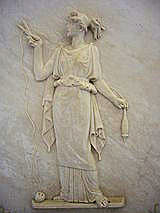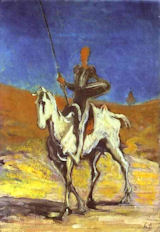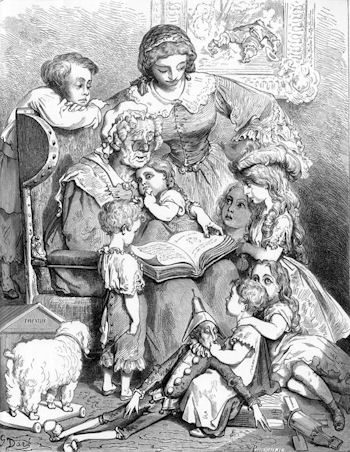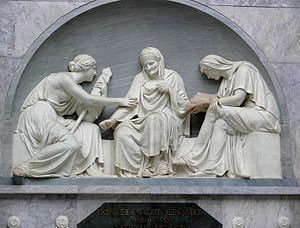



One subject. Two facets. This website wouldn't exist if I did not believe that all storytelling is based either on Fairy Tale, or on Myth, its grownup sophisticated sibling.
* * * * *

Fairy Tales for an older generation were not at all like today's sanitized and cuddly aids to moral instruction and ecological improvement. Pain, suffering, and unimaginable cruelty were the mainstays of Fairy Tale in the old days, with no correlation between deservingness and punishment, worthiness and reward. Of course we had some say in which stories we wanted read, some of us (usually male) choosing to be terrified, and others preferring a gentler style of organized thought.
I'm not entirely convinced that boys prefer the horrifying for its own sake; they love rather listening to the adventures of heroes who are successful against the frightsome troll under the bridge, the enticing witch with the candy house, the giant who smells little English boys and eats them for supper, and will tolerate not the slightest curtailment of the fulsome praise bestowed upon the victor by an admiring public.
It's noteworthy that with the exception of the brother and sister combination in Hansel and Gretel, the protagonist of Fairy Tale always walks through life alone. Of course we've forgotten what it was to be a child; I rather think that no matter how many people surrounded us, we experienced ourselves always as solitary bystanders, helpless before the rapid onslaught of events on every side.
Every Fairy Tale is a journey, a bewildering travel from a time before time to a completion beyond the constricting limits of childhood, and aloneness, to a culmination point of all living happily ever after.
The fact of learning to read for ourselves is one such culmination. Freed from dependence upon adult benevolence for entertainment — and everything else — we lose the perception of our solitariness, and our helplessness as well. Soon, very soon after learning to read, our love for Fairy Tale fails us, and we move on to Myth, and a world where things happen for a reason, and make sense.
Well, not really sense. But instead of the unplanned journeys, inexplicable adventures, and unaccountable detail of childhood Fairy Tale, Myth is more likely to involve a static situation, and endeavour to explain it by way of story. Narcissus comes to mind, and also the myth of The Moirae (The Spinners), those eerie impersonal women combing out the fibres of our lives, our fates, our destinies, some strands thinning out before resuming life at a greatly reduced strength, others winding themselves with undiminished strength and usefulness onto a cosmic spindle, and still others cut off suddenly in their prime.

The Moirae
(The Three Spinners):–
Clotho spinning the thread, Lachesis measuring it out, and Atropos
(see top of Left Column) cutting the thread with her shears.
It's not sense. But nor is it nonsense, as every young person knows whose own parent's life has been represented by a wayward strand of flax threading away to chronic illness, or to nothingness.
If Fairy Tale is the emotional equivalent of childhood, then Myth is the answer to the eternal adolescent question:— where am I, how did I get here, and what does it all mean?
* * * * *
______________________
______________________
______________________
______________________
______________________
______________________
________________________